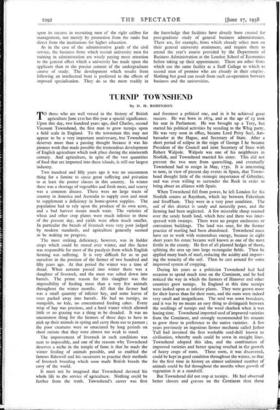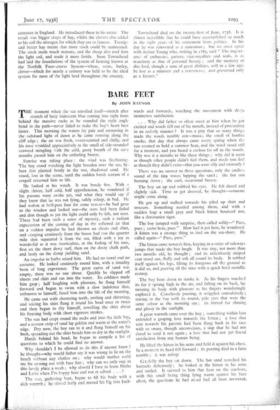TURNIP TOWNSHEND
By D. H. ROBINSON TO those who are well versed in the history of British agriculture June 21st has this year a special significance. Upon this day, two hundred years ago, died Charles, second Viscount Townshend, the first man to grow turnips upon a field scale in England. To the townsman this may not appear to be a very important anniversary, but Townshend deserves more than a passing thought because it was his pioneer work that made possible the tremendous development of English agriculture which took place during the nineteenth century. And agriculture, in spite of the vast quantities of food that are imported into these islands, is still our largest industry.
Two hundred and fifty years ago it was no uncommon thing for a famine to cause great suffering and privation to at least the poorer classes in this country. In winter there was a shortage of vegetables and fresh meat, and scurvy was a common disease. There were no large tracts of country in America and Australia to supply corn and meat to supplement a deficiency in home-grown supplies. The population had to rely upon the produce of its own acres, and a bad harvest meant much want. The varieties of wheat and other crop plants were much inferior to those of the present day, and yields were often much smaller. In particular the breeds of livestock were very poor judged by modern standards, and agriculture generally seemed to be making no progress.
The most striking deficiency, however, was in fodder crops which could be stored over winter, and this factor was responsible for most of the paralysis from which English farming was suffering. It is very difficult for us to put ourselves in the position of the farmer of two hundred and fifty: years ago. At that period the winter was a time of dread. When autumn passed into winter there was a slaughter of livestock, and the meat was salted down into barrels. The prime reason for this slaughter was the impossibility of feeding more than a very few animals throughout the winter months. All that the farmer had was a small quantity of inferior hay, and some leaves of trees packed away into barrels. He had no turnips, no mangolds, no kale, no concentrated feeding cakes. Every wisp of hay was precious, and a hard winter which allowed little or no grazing was a thing to be dreaded. It was no uncommon thing for the farmers of those days to have to pick up their animals in spring and carry them out to pasture ; the poor creatures were so emaciated by long periods on short rations that they were almost too weak to stand.
The improvement of livestock in such conditions was next to impossible, and one of the reasons why Townshend deserves a niche in the temple of fame is that he made the winter feeding of animals possible, and so enabled the famous Bakewell and his successors to practise their methods of livestock breeding which soon made British breeds the envy of the world.
It must not be imagined that Townshend devoted his whole life to the service of agriculture. Nothing could be further from the truth. Townshend's career was first and foremost a political one, and in it he achieved great success. He was born in 1674, and at the age of 23 took his seat in Parliament. He was brought up a Tory, but started his political activities by seceding to the Whig party. He was very soon in office, became Lord Privy Seal, Am- bassador at the Hague, and Secretary of State. After a short period of eclipse in the reign of George I he became President of the Council and joint Secretary of State with Robert Walpole. Walpole was one of his neighbours in Norfolk, and Townshend married his sister. This did not prevent the two men from quarrelling, and eventually Townshend had to resign in May, 173o. It is interesting to note, in view of present day events in Spain, that Towns- hend thought little of the strategic importance of Gibraltar, and was even willing to surrender the Rock in order to bring about an alliance with Spain.
When Townshend fell from power, he left London for his Norfolk estates at Raynham, which lay between Fakenham and Swaffham. They were in a very poor condition. The soil of this district is sandy and naturally poor, and the farming had been neglected. A few miserable sheep roamed over the sandy heath land, which here and there was inter- spersed with swamps. There were no proper enclosures or convenient buildings. The land was sour, for the former practice of marling had been abandoned. Townshend must have set to work with tremendous energy, because in eight short years his estate became well known as one of the most fertile in the county. He first of all planted hedges of thorn, splitting the area np into large rectangular fields. Then he applied many loads of marl, reducing the acidity and improv- ing the tenacity of the soil. Then he cast around for some improved system of cropping.
During his years as a politician Townshend had had occasion to spend much time on the Continent, and he had noticed the way in which the farmers of Hanover and other countries grew turnips. In England at this time turnips were looked upon as inferior plants. They were grown more for their leaves than for their roots, and the roots were indeed very small and insignificant. The seed was sown broadcast, and it was by no means an easy thing to distinguish between the seedlings of turnips and the weed charlock when it was hoeing time. Townshend imported seed of improved varieties from the Continent, and strongly recommended his tenants to grow these in preference to the native varieties. A few years previously an ingenious fanner mechanic called Jethro Tull had invented the first workable seed-drill known to civilisation, whereby seeds could be sown in straight lines. Townshend adopted this idea, and the combination of improved varieties and better spacing resulted in the growth of heavy crops of roots. These roots, it was discovered, could be kept in good condition throughout the winter, so that for the first time in history an almost unlimited number of animals could be fed throughout the months when growth of vegetation is at a standstill.
But Townshend did not stop at turnips. He had observed better clovers and grasses on the Continent than those common in England. He introduced these to his estate. The result was bigger crops of hay, whilst the clovers also added to his soil the nitrogen for which they are so famous. Turnips and better hay meant that more stock could be maintained. The stock made much manure, and the sheep also trod firm the light soil, and made it more fertile. Soon Townshend had laid the foundations of the system of farming known as the Norfolk Four-course System—wheat, roots, barley, clover—which for nearly a century was held to be the ideal system for most of the light land throughout the country. Townshend died on the twenty-first of June, 1738. It is almost incredible that he could have accomplished so much in the eight years of his retirement from politics. In his day he was renowned as a statesman ; but we must agree with Arthur Young who, writing in 1785, said " The import- anc2 of embassies, garters, vice-royalties and seals, is as transitory as that of personal beauty ; and the memory of this lord, though a man of great abilities, will in a few ages be lost as a minister and a statesman ; and preserved only as a farmer."



















































 Previous page
Previous page